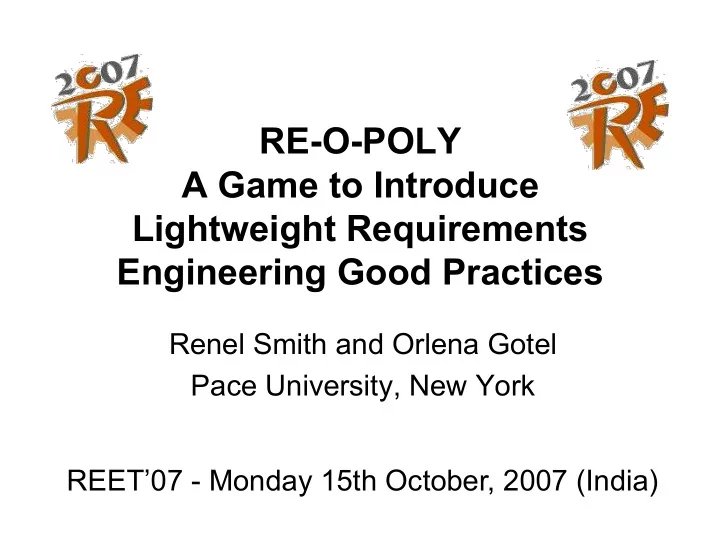

RE-O-POLY A Game to Introduce Lightweight Requirements Engineering Good Practices Renel Smith and Orlena Gotel Pace University, New York REET’07 - Monday 15th October, 2007 (India)
Problem • Learning about RE practices can be boring / costly: – Too much textually dense material – Have to grab attention within an hour (or two) • Many RE practices rely on participation with others and discursive activities • Practices make better sense if contextualized • Practices are not retained if not used
Objectives / Method • Focus on awareness of key practices, their value, role of negotiation / decision making • Review RE good practices and identify a lightweight set to help small novice organizations in requirements efforts • Develop a simple game to teach RE good practices to novice requirements engineers by reinforcing a small set of lessons based upon the above
Game-Play Prerequisites • Players new(ish) to RE • Players from same domain • Played in conjunction with RE training • Facilitated • Contextualized: – One hour introduction – Organization-specific projects • Fast play / time-boxing
RE-O-Poly Game Concepts • Based on Monopoly • Money -> Stakeholder Satisfaction Points • Board • Chance -> Scenarios • Community Chest -> Tasks • Properties -> Projects • Wild Cards • Board circuits -> Iterations • Decks to keep • Houses and hotels -> Resources
Stakeholder Satisfaction Points • Players earn or forfeit SSPs as game progresses • How do you compete? • How do you win?
The Board
Scenario Cards Shows what happens when good RE practices are implemented or not We need your teaching tips!
Task Cards • Opportunity to earn (or lose) SSPs by answering RE questions • Time-boxed • Verdict by vote
Project Cards Front ont Bac ack For players Comple omplex x to own, run Identify 2 key stakeholders for this and buy project (20 SSP) Project oject resources What technique(s) would for, using you use to elicit Real-time requirements from the key SSPs and stakeholders (25 SSP) Fund by What non-functional Exchange System requirements are going to managing be critical to explore for 300 SSP tasks this project and why? (30 SSP)
Wild Cards Requirements You buy a tool are ambiguous thinking it will -- miss a turn to solve problems rewrite them Get out of RE -- pay 50 SSP training FREE Tool used with Requirements no process in are completed place -- pay 100 early -- go to Go directly to SSP next iteration RE training Tool used with Requirements Unique IDs process in place scope creeps -- helped track a -- receive 100 return to start of change -- roll SSP this iteration again
Other Concepts • Iterations - one time round the board equates to one iteration of RE activities • Decks - players get to keep a copy of the scenario cards as learning material • Resources - SSPs can be used to buy books, templates and tools for project activities • Quality - it is in everyone’s hands
Ongoing Work • Creating more projects, scenarios and tasks • Fine tuning game play • Playing some games: • 2 sessions planned for fall 07 - one with Pace graduates, one with bank employees • Understanding impact of the game: • Designing pre and post game-play educational assessment instruments • Comparing to other forms of RE education and training • Exploring other gaming genres
Recommend
More recommend